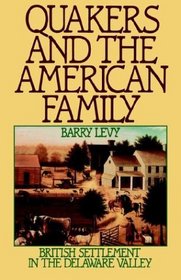Leo T. reviewed Quakers and the American Family: British Settlement in the Delaware Valley on + 1775 more book reviews
I thought this consideration of the Quakers in both England and in America is the product of Dr. Levy's PhD. work, but perhaps not. He and his young family were supported by a few modest grants but he did solicit critical comment from the leading lights of colonial historical research such as Simler, Tate, Norton, Nash, and Bailyn. It is a very scholarly tome that I obtained as an add-on from a PBS comrade and will leave on the book truck in the lobby of the VA Hospital, where there are many readers and little nonfiction on offer. He quotes obscure original sources to make his case, such as a list of orphans and the terms of their indentures, and a survey of landholdings of several families. However, even well off families like the latter would lose grown children to the 'world.'
"As I researched this topic, I did become increasingly touched by the psychological insight, devotion to emotional truth, and exquisite, interpersonal morality of the farmers I was studying."
Sample: "One social curse for the Quaker discipline and for Quaker households in virtually every wealth stratum was the rise of the number of 'freemen' or economically independent bachelors over twenty-one years in Welsh tract and Chester towns. The Pennsylvania Assembly had defined a tax category known as 'freemen' in order to discourage stubborn bachelors, who were set aside to be taxed at a discriminatingly high rate. To qualify for this prejudicial position, a man had to be a bachelor, over twenty-one years, and had to be working for himself, not for his father, mother, or siblings. Among the Quakers, they were usually sons whose parents chose to let them live financially uninvolved in order to allow them freedom to earn their way into the Quaker marriage market. They became a major source of marriage delinquents and parental headaches."
A few well chosen plates, statistical appendix, fulsome endnotes, and index.
"As I researched this topic, I did become increasingly touched by the psychological insight, devotion to emotional truth, and exquisite, interpersonal morality of the farmers I was studying."
Sample: "One social curse for the Quaker discipline and for Quaker households in virtually every wealth stratum was the rise of the number of 'freemen' or economically independent bachelors over twenty-one years in Welsh tract and Chester towns. The Pennsylvania Assembly had defined a tax category known as 'freemen' in order to discourage stubborn bachelors, who were set aside to be taxed at a discriminatingly high rate. To qualify for this prejudicial position, a man had to be a bachelor, over twenty-one years, and had to be working for himself, not for his father, mother, or siblings. Among the Quakers, they were usually sons whose parents chose to let them live financially uninvolved in order to allow them freedom to earn their way into the Quaker marriage market. They became a major source of marriage delinquents and parental headaches."
A few well chosen plates, statistical appendix, fulsome endnotes, and index.




